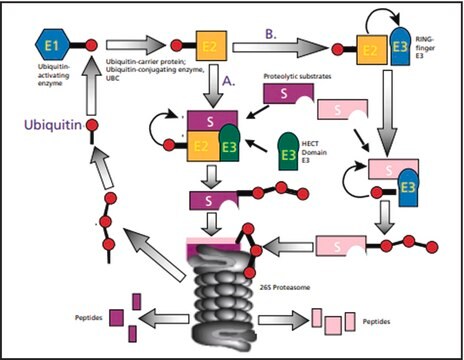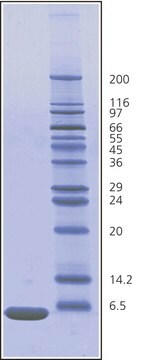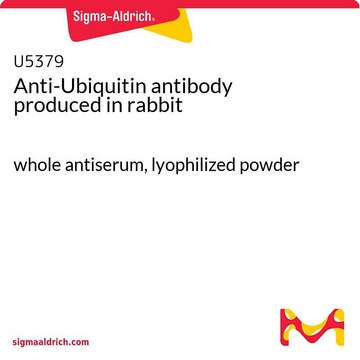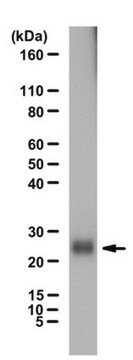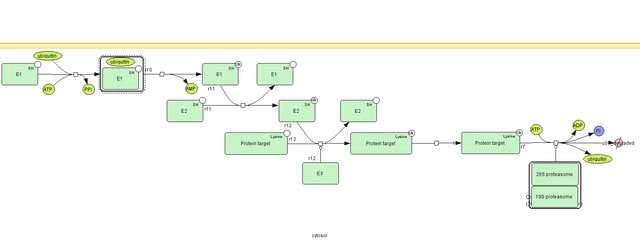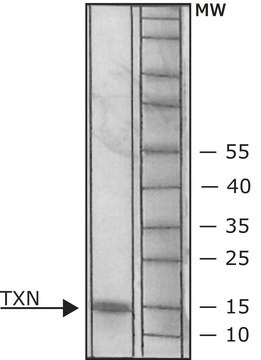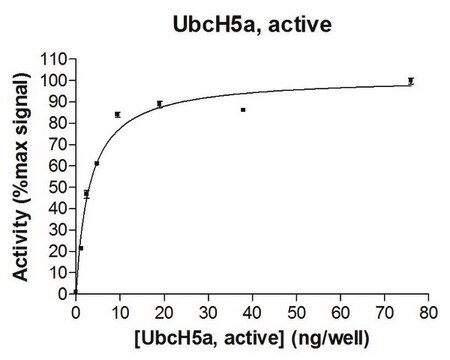Wszystkie zdjęcia(2)
Kluczowe dokumenty
U5507
Ubiquitin human
recombinant, expressed in E. coli (N-terminal histidine tagged)
Zaloguj sięWyświetlanie cen organizacyjnych i kontraktowych
About This Item
Polecane produkty
pochodzenie biologiczne
human
Poziom jakości
rekombinowane
expressed in E. coli (N-terminal histidine tagged)
Próba
≥95% (GE)
Formularz
lyophilized powder
masa cząsteczkowa
10.7 kDa
metody
ligand binding assay: suitable
rozpuszczalność
Tris-HCl, pH 7.5: 1.0—1.10 mg/mL, clear to slightly hazy, colorless
przydatność
suitable for molecular biology
temp. przechowywania
−20°C
Szukasz podobnych produktów? Odwiedź Przewodnik dotyczący porównywania produktów
Opis ogólny
Obszar badań: CANCER
Ubikwityna jest wysoce konserwatywnym białkiem składającym się z 76 aminokwasów i ulega ekspresji powszechnie u wszystkich eukariontów, od drożdży po ludzi.
Ubikwityna jest wysoce konserwatywnym białkiem składającym się z 76 aminokwasów i ulega ekspresji powszechnie u wszystkich eukariontów, od drożdży po ludzi.
Ubiquitin, a globular protein is made of 76 amino acids and has lysine residues on its surface. It has a molecular weight of 8565 Da.N-Terminal histidine-tagged ubiquitin can replace native ubiquitin in the formation of poly-ubiquitin—protein conjugates. The histidine tag enables the separation and enrichment of protein conjugates on a Ni(II) column and the detection of conjugates in western blot by anti-histidine-tag antibodies.
Zastosowanie
Ubiquitin human can be used as a test compound for studying the isolation and characterization of rice E3-ubiquitin ligase and the role of OsHOS1 gene in the modulation of the cold stress response.
Ubiquitin human has been used:
- as a substrate in in vitro ubiquitination assays
- as substrate in ADP-ribosylation and ubiquitylation assays
- to supplement the 64 ng of endogenous ubiquitin in fresh blood for experiment grouping in order to study its potential clinical impact on cancer prognosis
Działania biochem./fizjol.
Proteoliza za pośrednictwem ubikwityny odgrywa ważną rolę w kilku podstawowych procesach komórkowych, w tym w regulacji cyklu komórkowego i podziału, różnicowaniu i rozwoju, modulacji receptorów na powierzchni komórki, szlaku wydzielniczym (transport białek), morfogenezie sieci neuronalnych, regulacji transkrypcji i transdukcji sygnału, wyciszaniu transkrypcji, naprawie DNA, pamięci długoterminowej i rytmach okołodobowych.
Ubiquitin is a small regulatory protein present in eukaryote tissues. Exogenous ubiquitin can stimulate apoptosis in numerous cell lines. E7 protein of human papilloma virus-16 stimulates Retinoblastoma Protein degradation via Ubiquitin-Proteasome Pathway.
Ubiquitin plays a key role in normal eukaryotic cell function. It participates in the development and function of the immune system. This immunophilin is also known to participate in immune homeostasis. The ubiquitin peptide fragment (U50-59) is capable of blocking cellular and humoral immunity.
Uwaga dotycząca przygotowania
Ubiquitin human can dissolved in 0.02 M Tris-HCl at a concentration of 1.00 - 1.10 mg/ml to yield a clear to slightly hazy, colorless solution.
Ta strona może zawierać tekst przetłumaczony maszynowo.
Kod klasy składowania
11 - Combustible Solids
Klasa zagrożenia wodnego (WGK)
WGK 3
Temperatura zapłonu (°F)
Not applicable
Temperatura zapłonu (°C)
Not applicable
Środki ochrony indywidualnej
Eyeshields, Gloves, type N95 (US)
Wybierz jedną z najnowszych wersji:
Masz już ten produkt?
Dokumenty związane z niedawno zakupionymi produktami zostały zamieszczone w Bibliotece dokumentów.
Klienci oglądali również te produkty
New crystal form of human ubiquitin in the presence of magnesium
Camara-Artigas A, et al.
Acta Crystallographica. Section F, Structural Biology Communications, 72(1), 29-35 (2016)
Extracellular Ubiquitin is the Causal Link between Stored Blood Transfusion Therapy and Tumor Progression in a Melanoma Mouse Model
Zhang J, et al.
Journal of Cancer, 10(12), 2822-2835 (2019)
Jingjun Zhang et al.
Journal of Cancer, 10(12), 2822-2835 (2019-07-02)
Background: The transfusion of blood that has been stored for some time was found to be associated with transfusion-related immune modulation (TRIM) responses in cancer patients, which could result in poor clinical outcomes, such as tumor recurrence, metastasis and reduced
Proteomics strategy to identify substrates of LNX, a PDZ domain-containing E3 ubiquitin ligase
Guo Z, et al.
Journal of Proteome Research, 11(10), 4847-4862 (2012)
Antigenic mimicry of ubiquitin by the gut bacterium Bacteroides fragilis: a potential link with autoimmune disease
Stewart L, et al.
Clinical and Experimental Immunology, 194(2), 153-165 (2018)
Nasz zespół naukowców ma doświadczenie we wszystkich obszarach badań, w tym w naukach przyrodniczych, materiałoznawstwie, syntezie chemicznej, chromatografii, analityce i wielu innych dziedzinach.
Skontaktuj się z zespołem ds. pomocy technicznej